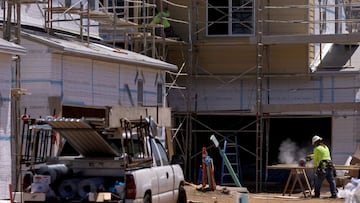Mortgage lock rates increased in February, why?
Inflation is beginning to take its toll on the American housing market, with buyers and renters in trouble as prices spike.


The number of people locking in their mortgage rates have had a big rise at the start of 2022, as home-buyers prepare for a big increase later in the year.
A report from Black Knight says that rate locks have risen nearly 10 percent since December, suggesting buyers are aware that the current low locks need to be exploited before they become too expensive. To match this, there has been a near 20 percent increase in the amount of loans being taken out to afford down payments.
It’s still a very attractive time to be a buyer, but the clock is ticking. If you continue to delay that purchase, you’re probably looking at a more expensive home and costly mortgage. It’s frankly better to act now rather than later, but that’s easier said than done.
Jeffrey Ruben. president of WSFS Mortgage, speaking to Yahoo Money
Housing is expected to continue to increase in price massively in 2022 due to the high inflation in the US economy, the latest value of which was 7.5 percent in the last year.
Why is housing so expensive?
Money saved during the pandemic meant that the opening of the economy allowed plenty of people to buy new houses, driving up their value. As of the last quarter of 2021, house prices had risen 14.2 percent on a year prior, putting the median average for a one family home to $361,700.
After hanging steady throughout most of 2021, the turn of the year saw a surge in the average mortgage rates. The average 30-year fixed rate mortgage now stands at 3.92 percent, nearly a full percentage in just four months.
The 30-year mortgage rate in the US rises to 3.92%, its highest level since May 2019. In January of last year it hit an all-time low of 2.65%. pic.twitter.com/EfOVVwzxOG
— Charlie Bilello (@charliebilello) February 17, 2022
This has partly been driven by fears that the Federal Reserve will increase interest rates this year. There will be a hike in March, but it is still unclear how much the increase will be by the end of the year.
Related stories
This rampant inflation is having an effect on the renting market too. Rising rents to compete with the cost of living, coupled with landlord greed, threaten to keep inflation high as wages try and keep up.
With house prices up 14% and an avg first time buyer deposit of €52,000 we have locked an entire generation into a life of insecure & unaffordable renting.
— People Before Profit (@pb4p) February 17, 2022
Join us on Feb 26 for a national day of action on housing. For more info see https://t.co/OJW9R9g88q pic.twitter.com/lni1HGy2qK
US Census Bureau data shows rental vacancy rates during the fourth quarter of 2021 fell to 5.6 percent, the lowest since 1984. Figures like this give landlords the opportunity to set high rents without fear of leaving unfilled properties.Compounding this, according to Realtor.com, there is a shortfall of nearly 6 million family homes, a 50 percent increase since the start of the pandemic.

